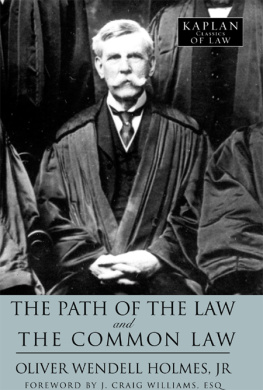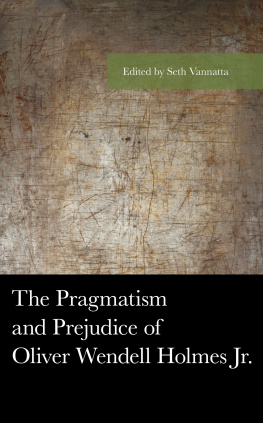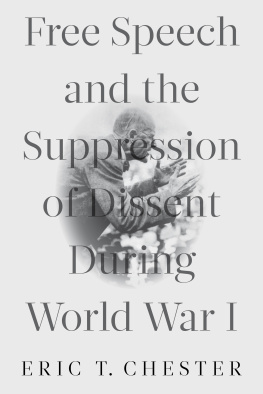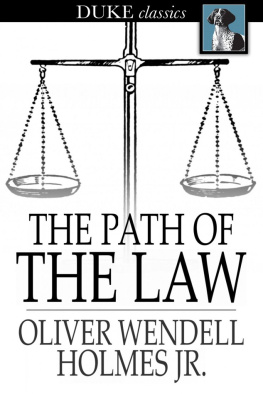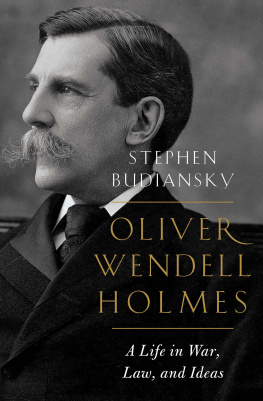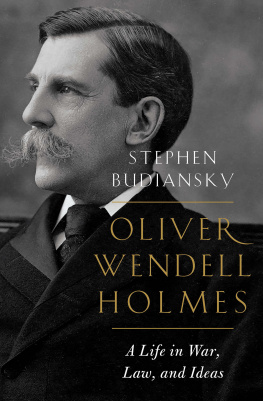Thomas Healy - The Great Dissent: How Oliver Wendell Holmes Changed His Mind-and Changed the History of Free Speech in America
Here you can read online Thomas Healy - The Great Dissent: How Oliver Wendell Holmes Changed His Mind-and Changed the History of Free Speech in America full text of the book (entire story) in english for free. Download pdf and epub, get meaning, cover and reviews about this ebook. year: 2014, publisher: Picador, genre: History. Description of the work, (preface) as well as reviews are available. Best literature library LitArk.com created for fans of good reading and offers a wide selection of genres:
Romance novel
Science fiction
Adventure
Detective
Science
History
Home and family
Prose
Art
Politics
Computer
Non-fiction
Religion
Business
Children
Humor
Choose a favorite category and find really read worthwhile books. Enjoy immersion in the world of imagination, feel the emotions of the characters or learn something new for yourself, make an fascinating discovery.

- Book:The Great Dissent: How Oliver Wendell Holmes Changed His Mind-and Changed the History of Free Speech in America
- Author:
- Publisher:Picador
- Genre:
- Year:2014
- Rating:3 / 5
- Favourites:Add to favourites
- Your mark:
- 60
- 1
- 2
- 3
- 4
- 5
The Great Dissent: How Oliver Wendell Holmes Changed His Mind-and Changed the History of Free Speech in America: summary, description and annotation
We offer to read an annotation, description, summary or preface (depends on what the author of the book "The Great Dissent: How Oliver Wendell Holmes Changed His Mind-and Changed the History of Free Speech in America" wrote himself). If you haven't found the necessary information about the book — write in the comments, we will try to find it.
Thomas Healy: author's other books
Who wrote The Great Dissent: How Oliver Wendell Holmes Changed His Mind-and Changed the History of Free Speech in America? Find out the surname, the name of the author of the book and a list of all author's works by series.
The Great Dissent: How Oliver Wendell Holmes Changed His Mind-and Changed the History of Free Speech in America — read online for free the complete book (whole text) full work
Below is the text of the book, divided by pages. System saving the place of the last page read, allows you to conveniently read the book "The Great Dissent: How Oliver Wendell Holmes Changed His Mind-and Changed the History of Free Speech in America" online for free, without having to search again every time where you left off. Put a bookmark, and you can go to the page where you finished reading at any time.
Font size:
Interval:
Bookmark:
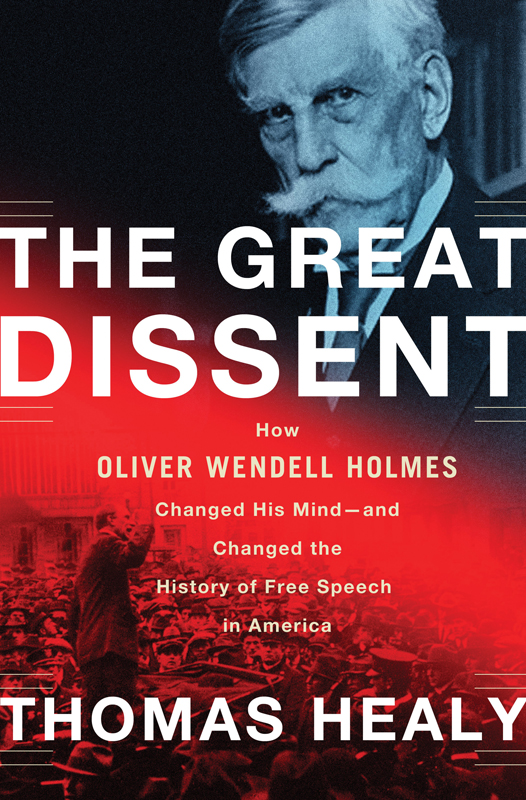

The author and publisher have provided this e-book to you for your personal use only. You may not make this e-book publicly available in any way. Copyright infringement is against the law. If you believe the copy of this e-book you are reading infringes on the authors copyright, please notify the publisher at: us.macmillanusa.com/piracy.
To Arlene
CONTENTS
PROLOGUE
An Unexpected Visit
On Friday, November 7, 1919, as federal agents launched a nationwide raid on the homes and meeting halls of Russian immigrants, three members of the United States Supreme Court mounted the steps of a redbrick town house in Washington, D.C., just blocks away from the White House. Unlike the agents, who had been dispatched by an ambitious young official named J. Edgar Hoover, the justices were not hunting for communists. They were there to call on their colleague Oliver Wendell Holmes Jr., Boston Brahmin, Civil War veteran, and sage of the common law. But their visit, unusual and unexpected, was linked to the larger mission being carried out that day, and, to the justices at least, it was every bit as important.
They were greeted by Holmess wife, Fanny, and led up the steep stairs to the second floor, where Holmes had his study. In those days, the justices did not have offices at the Supreme Court; instead they researched and wrote their opinions at home, sending notes and drafts to one another by messenger. Holmess study was spacious and bright, two high-ceilinged rooms connected by sliding double doors. In the rear room, looking out over a small garden, stood a cherrywood desk that had belonged to his grandfather, a judge on the Massachusetts Supreme Judicial Court, as well as an old-fashioned upright desk. This is where Holmes worked, alternating between the two desks and a comfortable leather chair in front of the fireplace. On the mantel were photographs of several young female friends, and high above them hung two crossed swords, one used by his great grandfather during the French and Indian War and another carried by Holmes himself during the Civil War. Through the doors was a smaller room where his secretary worked at a desk handed down by Holmess father, the famous doctor and author. Bookshelves lined both rooms, climbing the walls and wrapping around the windows and doorways like ivy. Their shelves were packed tight with booksmore than ten thousand volumes in all, mostly law, philosophy, and history, but also the occasional detective story or racy French novel.
Because the Court term was under way, Holmes was dressed in a morning coat with a stiff white shirt and high collar. He welcomed his visitors into the study and motioned to his secretary, Stanley Morrison, to stay in the adjoining room with the doors open. Like nearly all the rest of Holmess secretaries, Morrison was a recent graduate of Harvard Law School who had been handpicked for the job by a trusted faculty member. He was also the friend of another Court secretary that year by the name of Dean Acheson, and after the visit he told Acheson what had happened. Acheson, of course, went on to achieve his own fame as secretary of state during the Cold War, and when he wrote a memoir of his early years in Washington he recounted the incident, which is how we know about it today.
After they were seated and had exchanged pleasantries, the three justicesWillis Van Devanter, Mahlon Pitney, and a third whose name Acheson could not rememberexplained the reason for their visit. The day before, Holmes had circulated a dissenting opinion in a case the Court had heard two weeks earlier. It was an important case testing the governments power to punish the anarchists and agitators who had spoken out against the recent war. And for most members of the Court, it was an easy case. Of course the government could punish such troublemakers. Freedom of speech was not absolute, and if the defendants had intended to disrupt the war, they deserved to be treated as criminals.
The majority of the Court, and anyone who followed its decisions, might have expected Holmes to agree. After all, just nine months earlier he had written three opinions for the Court saying pretty much the same thing. One of those cases was an appeal by Eugene V. Debs, the leader of the Socialist Party and a frequent candidate for president, who had been sentenced to ten years in prison for a speech he had given in the summer of 1918. It was essentially a stump speech, an effort to fire up the base in advance of the fall elections, and Debs had chosen his words carefully. He said nothing that explicitly urged interference with the war, though he did praise party members who had opposed the draft. For Holmes, that had been enough. In a short and dismissive opinion, he had accepted the jurys verdict that Debs meant to illegally obstruct military recruiting and had affirmed his conviction.
So when the Court heard arguments in the anarchists case, few people expected Holmes to side with the defendants. But something had changed. Instead of voting with the majority, Holmes said the convictions should be reversed. The defendants had no intent to undermine the fight against Germany, he explained. They were merely upset with President Wilsons decision to intervene in the Russian Revolution. Besides, he argued, their speech was protected by the First Amendment. This last point was no small matter. In spite of its seemingly clear commandCongress shall make no law abridging the freedom of speechthe First Amendment at that time was still largely an unfulfilled promise. The Supreme Court itself had never ruled in favor of a free speech claim, and lower courts had approved all manner of speech restrictions, including the censorship of books and films, the prohibition of street corner speeches, and assorted bans on labor protests, profanity, and commercial advertising. Even criticism of government officials could be punished, the courts had ruled, if it threatened public order and morality. But now, with the country gripped by fear of the communist threat, Holmes was proposing something radical: an expansive interpretation of the First Amendment that would protect all but the most immediately dangerous speech. His opinion was passionate and powerful, especially the long concluding paragraph. This began strangely, incongruently, as though Holmes were making the case against free speech, not for it:
Persecution for the expression of opinions seems to me perfectly logical. If you have no doubt of your premises or your power and want a certain result with all your heart you naturally express your wishes in law and sweep away all opposition. To allow opposition by speech seems to indicate that you think the speech impotent, as when a man says that he has squared the circle, or that you do not care whole heartedly for the result, or that you doubt either your power or your premises
Then, just as the reader began to blink in confusion, wondering if something had gone wrong, if perhaps the printer had made an error, Holmes suddenlybrilliantlychanged direction:
But when men have realized that time has upset many fighting faiths, they may come to believe even more than they believe the very foundations of their own conduct that the ultimate good desired is better reached by free trade in ideasthat the best test of truth is the power of the thought to get itself accepted in the competition of the market, and that truth is the only ground upon which their wishes safely can be carried out. That at any rate is the theory of our Constitution. It is an experiment, as all life is an experiment. Every year if not every day we have to wager our salvation upon some prophecy based upon imperfect knowledge. While that experiment is part of our system I think that we should be eternally vigilant against attempts to check the expression of opinions that we loathe and believe to be fraught with death, unless they so imminently threaten immediate interference with the lawful and pressing purposes of the law that an immediate check is required to save the country.
Font size:
Interval:
Bookmark:
Similar books «The Great Dissent: How Oliver Wendell Holmes Changed His Mind-and Changed the History of Free Speech in America»
Look at similar books to The Great Dissent: How Oliver Wendell Holmes Changed His Mind-and Changed the History of Free Speech in America. We have selected literature similar in name and meaning in the hope of providing readers with more options to find new, interesting, not yet read works.
Discussion, reviews of the book The Great Dissent: How Oliver Wendell Holmes Changed His Mind-and Changed the History of Free Speech in America and just readers' own opinions. Leave your comments, write what you think about the work, its meaning or the main characters. Specify what exactly you liked and what you didn't like, and why you think so.



